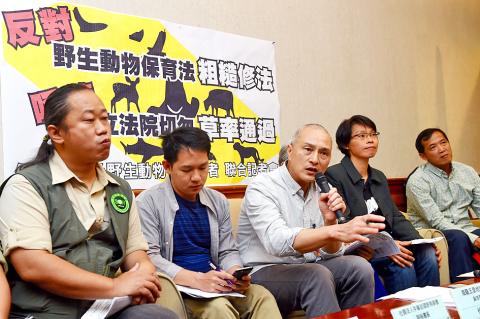A coalition of conservation groups yesterday condemned draft amendments to the Wildlife Conservation Act (野生動物保育法) that would allow Aborigines to hunt protected animals for self-use or non-profit purposes, which the groups said could be used as an excuse for commercial hunting.
The existing law allows Aborigines to hunt wildlife for cultural or ritual purposes on a case-by-case basis; the amendments, which the legislature’s Economics Committee proposed on Friday last week, would broaden the scope to legalize “self-use” or “non-profit” hunting by applying for a permit beforehand or submitting a report after the hunt.
Conservationists also criticized proposed amendments that would allow farmers to “deal” with crop-destroying animals and ban snare traps made with powerful springs, but not other types of snares.

Photo: Chien Jung-fong, Taipei Times
“The definition of self-use is too fuzzy and can be used as an excuse for commercial hunting and animal trade. Who is to decide what are crop-destroying animals and how are we to deal with them? Can crop-destroying animals be traded?” Environment and Animal Society of Taiwan chief executive officer Wu Hung (朱增宏) asked.
“With all due respect to Aborigines and Aboriginal traditions, hunting can damage the fragile wildlife population ... The situation will worsen given a market economy and modern hunting gear,” National Pingtung University of Science and Technology Institute of Wildlife Conservation director Hwang Mei-hsu (黃美秀) said.
Showing snares made with a wire noose and photographs of Formosan black bears with missing paws, Hwang said modern traps are too destructive and indiscriminate, and not part of Aboriginal traditions.
Hwang, who is also the honorary president of the Taiwan Black Bear Conservation Association, said eight of 15 Taiwan black bears she studied in 2000 had been injured by snare traps, and yet they continue to face the same threat.
She called for a complete ban on all kinds of traps and for the government to fund and launch a nationwide wildlife census to understand wildlife population and the effects of hunting.
“There is no opposition between Aborigines and conservationists. What we all want is a sustainable environment in which humans and animals can live in harmony,” she said.
Marine conservation group Oceanus Honors Gaia deputy director Lin Yu-kai (林于凱) said that conservationists respect and support Aborigines’ rights to self government and preserving tradition, but that should not compromise wildlife conservation.
“If hunting can be carried out on a reporting basis without approval in advance, how can hunting activities be monitored?” Lin asked.
Meanwhile, the committee discontinued the review of a draft bill on animal release practices.
Chinese Wild Bird Federation deputy director Chen Te-chih (陳德治) said many wildlife transactions were conducted solely to support the religious practice of releasing animals, which has caused mass deaths and could damage the ecology and biodiversity as released animals might be invasive species.
The groups urged lawmakers to reconsider the draft amendments and not to revise the act until further negotiations.

Actor Darren Wang (王大陸) was questioned by prosecutors for allegedly orchestrating an attack on a taxi driver after he was allegedly driven on a longer than necessary route in a car he disliked. The questioning at the New Taipei City District Prosecutors’ Office was ongoing as of press time last night. Police have recommended charges of attempted murder. The legally embattled actor — known for his role in the coming-of-age film Our Times (我的少女時代) — is under a separate investigation for allegedly using fake medical documents to evade mandatory military service. According to local media reports, police said Wang earlier last year ordered a

CAUTION: Based on intelligence from the nation’s security agencies, MOFA has cautioned Taiwanese travelers about heightened safety risks in China-friendly countries The Ministry of Foreign Affairs (MOFA) yesterday urged Taiwanese to be aware of their safety when traveling abroad, especially in countries that are friendly to China. China in June last year issued 22 guidelines that allow its courts to try in absentia and sentence to death so-called “diehard” Taiwanese independence activists, even though Chinese courts have no jurisdiction in Taiwan. Late last month, a senior Chinese official gave closed-door instructions to state security units to implement the guidelines in countries friendly to China, a government memo and a senior Taiwan security official said, based on information gathered by Taiwan’s intelligence agency. The

Taiwan Semiconductor Manufacturing Co (TSMC), the world’s largest contract chipmaker, said yesterday that it is looking to hire 8,000 people this year, at a time when the tech giant is expanding production capacity to maintain its lead over competitors. To attract talent, TSMC would launch a large-scale recruitment campaign on campuses across Taiwan, where a newly recruited engineer with a master’s degree could expect to receive an average salary of NT$2.2 million (US$60,912), which is much higher than the 2023 national average of NT$709,000 for those in the same category, according to government statistics. TSMC, which accounted for more than 60 percent

President William Lai (賴清德) should protect Taiwan Semiconductor Manufacturing Co (TSMC), and stop supporting domestic strife and discord, former president Ma Ying-jeou (馬英九) wrote on Facebook yesterday. US President Donald Trump and TSMC on Monday jointly announced that the company would invest an additional US$100 billion over the next few years to expand its semiconductor manufacturing operations in the US. The TSMC plans have promoted concern in Taiwan that it would effectively lead to the chipmaking giant becoming Americanized. The Lai administration lacks tangible policies to address concerns that Taiwan might follow in Ukraine’s footsteps, Ma wrote. Instead, it seems to think it could